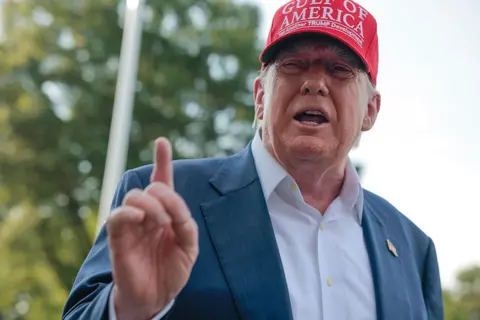Trump announces trade deal with Vietnam
 Getty Images
Getty ImagesPresident Donald Trump said on Wednesday that the US will charge 20% tariffs on imports from Vietnam under a new trade deal reached during last-minute negotiations.
Products sent from Vietnam to the US had faced a 46% levy, which was set to go into effect next week as part of Trump's "reciprocal" tariffs announced in April.
Dozens of other economies, including the European Union and Japan, are still scrambling to make their own deals with the US before the planned increases.
Under the agreement, Vietnam will charge no tariffs on US products, Trump said in a social media post.
Tariffs, which are a tax on imports, are almost always paid by the company that is buying the goods rather than the business which makes the product.
While importers can decide to absorb the extra charge, they often choose to pass it on to the consumer. Many of the US trading partners are worried that will drive down demand for things made in their countries.
In the "Great Deal of Cooperation", as Trump called it, the US will also impose a steeper tariff of 40% on goods that pass through Vietnam in a process known as "trans-shipping".
Peter Navarro, Trump's senior counsellor on trade and manufacturing, has said that a third of all Vietnamese exports to the US were actually Chinese products shipped through Vietnam.
The president said on social media: "Vietnam will do something that they have never done before, give the United States of America TOTAL ACCESS to their Markets for Trade.
"In other words, they will 'OPEN THEIR MARKET TO THE UNITED STATES,' meaning that we will be able to sell our product into Vietnam at ZERO Tariff."
Vietnam has become a major manufacturing hub for a number of major brands such as Nike, Apple, the Gap and Lululemon. It was a beneficiary of firms moving factories out of China to avoid the tariffs Trump announced during his first term in office.
Share prices of companies making goods in Vietnam initially rose on news of the deal, although those gains were trimmed after it emerged products will still face a 20% tax.
Adam Sitkoff, executive director of the American Chamber of Commerce in Hanoi, told the BBC World Business Report he was optimistic that the trade deal leaves Vietnam "in a good position", adding that "companies that ship from [Vietnam] to the US are going to keep doing it".
But on the proposed tariff for so-called trans-shipping, Mr Sitkoff questioned the definition of the term, suggesting it can be "a vague and often politicised term in trade enforcement".
"It's unclear how much illegal re-routing Vietnamese officials will even be able to catch, or how much exists," he said.
Vietnam's General Secretary To Lam held a phone call with Trump on Wednesday, during which he reiterated an invitation for the US president to visit the country.
Separately, the Trump family has recently announced development projects in Vietnam.
The country's government approved a plan by the Trump Organization and local business Kinh Bac City Development to invest $1.5bn in hotels, golf courses and luxury real estate.
The Trump Organization is also scouting for locations to build a Trump Tower in Ho Chi Minh City.
Trump initially imposed steep levies on trading partners around the world in April , citing a lack of "reciprocity", but then announced a pause where they were all lowered to 10%.
Many countries then approached the US to negotiate trade deals, according to the White House.
Since April, Washington had so far only announced a pact with Britain and a deal to temporarily lower retaliatory duties with China.
